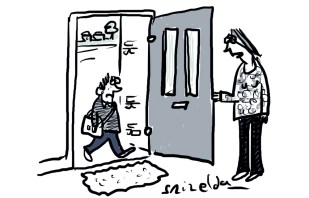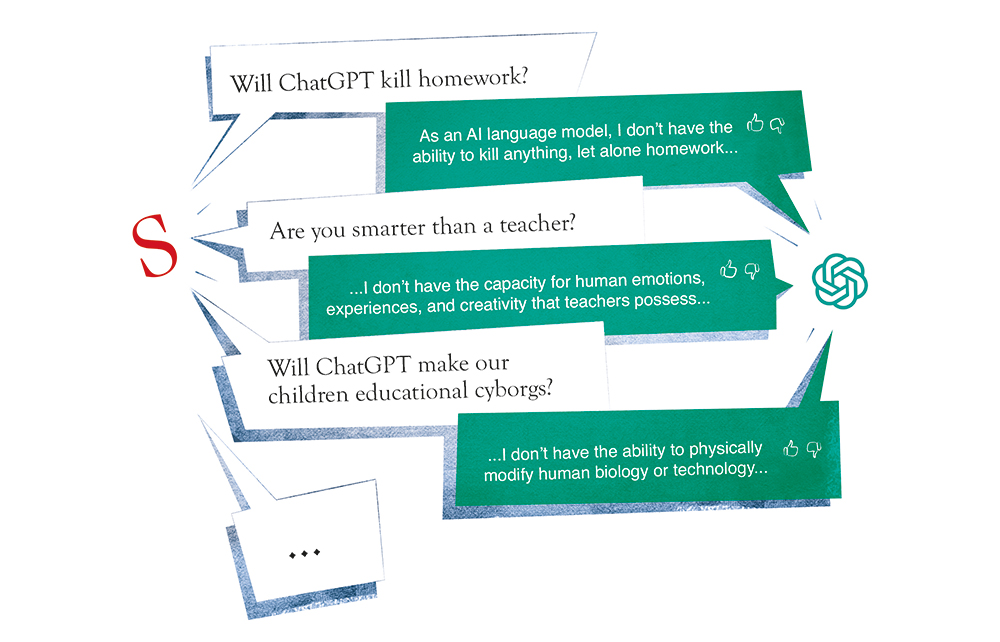If the success of a new technology can be measured by the speed of uptake, there is no denying the epochal impact of ChatGPT. Within five days of its launch in late November, the artificial intelligence chatbot, which can provide clear, detailed answers to human questions, was being used by a million people. Now it’s used by 100 million, with a growing waiting list of those looking for a chance to try it. Even the mighty Google has allegedly issued a ‘Code Red’, realising that a machine which can answer any question without having to send you off to some unreliable websites might pose a threat to its search-engine business model.
Bill Gates has said that ChatGPT is equivalent to the first PC. Others have claimed it’s akin to the dawning of the internet. Perhaps the grandest comparison of all comes from Larry Summers, the former US treasury secretary, who believes that the arrival of ChatGPT and consumer artificial intelligence is comparable to the harnessing of electricity in the 19th century. Or maybe even to the human ‘discovery’ of fire in about 1,000,000 bc.
Why endure the slow process of learning anything when a computer in your pocket will do it all for you?
It is, in other words, a Promethean technology that promises to bring down from the heavens to the humblest of humans an instant, unparalleled competence, especially in the comprehension and employment of language. Which is, no doubt, why this new AI is causing such alarm in schools, colleges and universities: the places where, hitherto, humans have had to go to diligently learn how to use languages – native languages, foreign languages, formal languages, the languages of maths and science.
Now that we have bots which seem to make much of traditional education pointless, why endure the slow process of learning anything when a computer in your pocket will do it all for you? And faster. And better.
These bots are only going to improve. At present they are glitchy. ChatGPT is known to ‘hallucinate’ -– to make up fake facts and false references – when stumped by a query. Google’s competitor, Bard, made an awkward factual error on the day it was launched. But these are teething problems in a machine that will soon develop mighty fangs. In time the bots will become flawless. They will not fail. And why should any student then risk human failure when the robot promises 100 per cent success?
The temptation to nihilistic panic in educational circles is understandable. To my mind, though, the gloom is being overdone. Yes, the era of traditional homework is coming to an end – when any student can go home and casually tap a button and ask for, and receive, an A-grade essay on the origins of the Korean War or quantum chromodynamics or Thomas Aquinas, there is no point setting essays as we understand them. Nor should educationalists rely on ‘watermarking’ – i.e. using AI to detect AI-generated answers. That is an utterly futile arms race. The technology exists and there is no going back.
The same sense of pointlessness attaches to many other proposed solutions to the AI-education conundrum. Are we really going to return to the age of oral exams, like Plato lyrically querying his students in the orchards of ancient Athens? What worked in Attica, among a few hundred upper-class Greeks, is not so easily achieved when you have tens of millions of students hoping to graduate every year. We don’t have enough olive groves. Likewise, the idea that we should revert to handwritten examinations, carefully invigilated to make sure no one is cheating with a ChatGPT up their sleeve, seems equally impractical and even more meaningless; like demanding in the 1900s that students write with goose quills rather than ink pens.
What then is the answer? Is there anywhere to turn for a more hopeful vision of AI and education? Perhaps we should look to another tech industry titan for a brighter perspective: Elon Musk – one of the co-founders of OpenAI, the company that built ChatGPT – who has said about artificial intelligence: ‘I’d rather be optimistic and wrong than pessimistic and right.’ According to Musk, from now on we need to see humans as cyborgs: as combinations of man and machine. Indeed, he thinks we are already cyborgs; we just don’t realise it.
As he points out, maybe 85 per cent of human beings have available at the ends of their arms – almost as an extension of their physical hands – a smartphone, which gives them immediate access to the world’s knowledge, news and opinions. All that the latest AI bots are doing is making this universal knowledge even easier to access, and enabling the user to turn the information into natural language.
Since there’s no way of stopping this (are we really going to ban smartphones?), the objective must be to adapt education to match the new capabilities of the student and to the vastly enlarged potential of everyone.
Think about that potential. Teachers will be able to plan lessons and mark homework almost instantly. Already you can ask ChatGPT to put together reading lists and precis chapters down to a single page. Tests and exams will be easily scanned and marked in minutes rather than hours – something that should free up teachers to explore more creative forms of teaching: finding examples in literature to inform a history lesson, for example. This has always been the wonder of technological development – removing the drudgery and repetition from human existence to allow us to do more.
But think, too, about what it might mean for the students themselves. Yes, they can ask AI what caused the Norman invasion, but inevitably something will be left out. This is where good teaching will come in. Students can explore what hasn’t been said. They can think about events and their causes and question the veracity of a simple explanation. In this way, AI can help teach children complexity. When the basic facts are a given – and can be passed on so quickly – the possibility for more in-depth study becomes easier.

Think of AI and education like this. Hitherto, students have been tested on their mental athleticism. Some can think fast and accurately, others are less agile. This is changing. From now on students will think like the scholarly equivalent of world-class sprinters. All of them will be able to run at the same speed as an intellectual Usain Bolt: to think as quickly as – and then much quicker than – even the most intelligent unassisted student of today.
Look at mathematics, which happily survived the invention of the calculator. Mental arithmetic, the ability to do your times tables or long division in your head, is no longer the operative element of teaching. Instead, it’s complexity, assisted by machine thinking. That assistance is what has allowed for even more fiendish mathematical problem solving, which in turn has given birth to real-world progress like computer-programming and coding. We are on the cusp of a similar development in the written word. Get ready for a new generation of cyborg historians, philosophers and writers.






Comments